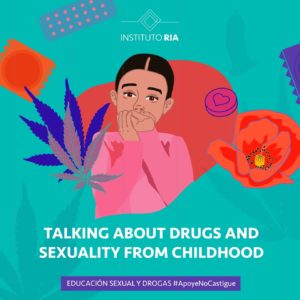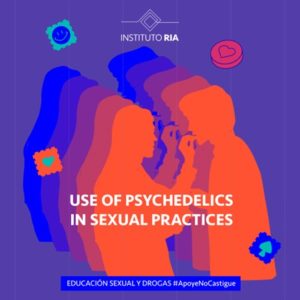By Jorge Herrera Valderrábano and Romina Vázquez, from Instituto RIA (an organisation doing research, education and advocacy on social justice and peacebuilding public policies).
Global estimates suggest that approximately 1 in 7 of adolescents have a mental health problem, and these estimates are based on incomplete data, representing less than 7% of the world’s adolescents. The COVID-19 pandemic has posed additional challenges to the mental health and well-being of adolescents and young adults, potentially increasing the prevalence of mental health disorders. Moreover, in 2020, about 1.75 million adolescents between the ages of 10 and 19 were living with HIV worldwide. Adolescents account for about 5% of all people living with HIV and about 11 per cent of new adult HIV infections. Outside of sub-Saharan Africa, the highest numbers of HIV-positive adolescents are in Asia and Latin America.
 We are committed to providing pragmatic, accurate and evidence-based education on drug use. For this reason, we decided to address this topic in combination with another that should be treated with sensitivity and precision: sexuality. Last year, as part of an activity within the framework of the Support Don’t Punish Global Day of Action, Instituto RIA launched a campaign on drugs and sexuality in social media. Continuing a project focused on middle school and high school students and with the visual support of infographics, we created a set of pedagogical materials providing information to different social sectors, to enhance education strategies on drug use and sexuality. The topics included: motherhood and cannabis, vulnerable populations who use drugs, the relationship between sex, drugs, and social networks, and sexual practices under the influence of stimulants, sedatives and psychedelics.
We are committed to providing pragmatic, accurate and evidence-based education on drug use. For this reason, we decided to address this topic in combination with another that should be treated with sensitivity and precision: sexuality. Last year, as part of an activity within the framework of the Support Don’t Punish Global Day of Action, Instituto RIA launched a campaign on drugs and sexuality in social media. Continuing a project focused on middle school and high school students and with the visual support of infographics, we created a set of pedagogical materials providing information to different social sectors, to enhance education strategies on drug use and sexuality. The topics included: motherhood and cannabis, vulnerable populations who use drugs, the relationship between sex, drugs, and social networks, and sexual practices under the influence of stimulants, sedatives and psychedelics.
In these pieces, we include information on the substances most frequently used during sexual practices. We discuss the expected effects, the most common presentations, available routes of administration, dosage recommendations, where to find more information, as well as harm reduction strategies. We felt it was important to point out the reasons to talk about drugs and sexuality beginning in childhood and adolescence, and to specify how it can be approached, including a short guide promoting socio-emotional skills to avoid problematic drug use or dependence. We also dove deep into the public health and social justice standards that key populations, such as the LGBTI+ community, sex workers, or people who inject drugs need.
Psychoactive substances can alter our ability to communicate effectively, so we thought it was appropriate to design a fact sheet on sex, drugs, and consent. Our capacity to provide consent under the effects of drugs depends on being able to make informed, enthusiastic decisions, free of pressure and coercion. There must be clear, voluntary, and unambiguous agreements. If the person cannot speak coherently, has difficulty walking, or is unconscious, they are definitely NOT able to give consent.
There must be clear, voluntary, and unambiguous agreements. If the person cannot speak coherently, has difficulty walking, or is unconscious, they are definitely NOT able to give consent.
 This project allowed us to offer key insights to conversations about sexuality and drug use. Unfortunately, information on both topics has historically been based on abstinence and prohibition, so it is necessary to promote a paradigm shift that prioritizes pleasure, care, and consent. Instituto RIA achieved high levels of outreach with the infographics, and we received positive comments about the importance of making visible these controversial topics. It was an excellent opportunity to continue opening the debate, to motivate organizations that are working on issues related to drug policies to do the same, and to strengthen networks that already share information based on scientific evidence. This year at the UN CND Session, we even organized a side event exploring this topic deeper. If you would like to see the infographics in English click here, or in Spanish click here. Thank you for your interest in our educational work!
This project allowed us to offer key insights to conversations about sexuality and drug use. Unfortunately, information on both topics has historically been based on abstinence and prohibition, so it is necessary to promote a paradigm shift that prioritizes pleasure, care, and consent. Instituto RIA achieved high levels of outreach with the infographics, and we received positive comments about the importance of making visible these controversial topics. It was an excellent opportunity to continue opening the debate, to motivate organizations that are working on issues related to drug policies to do the same, and to strengthen networks that already share information based on scientific evidence. This year at the UN CND Session, we even organized a side event exploring this topic deeper. If you would like to see the infographics in English click here, or in Spanish click here. Thank you for your interest in our educational work!